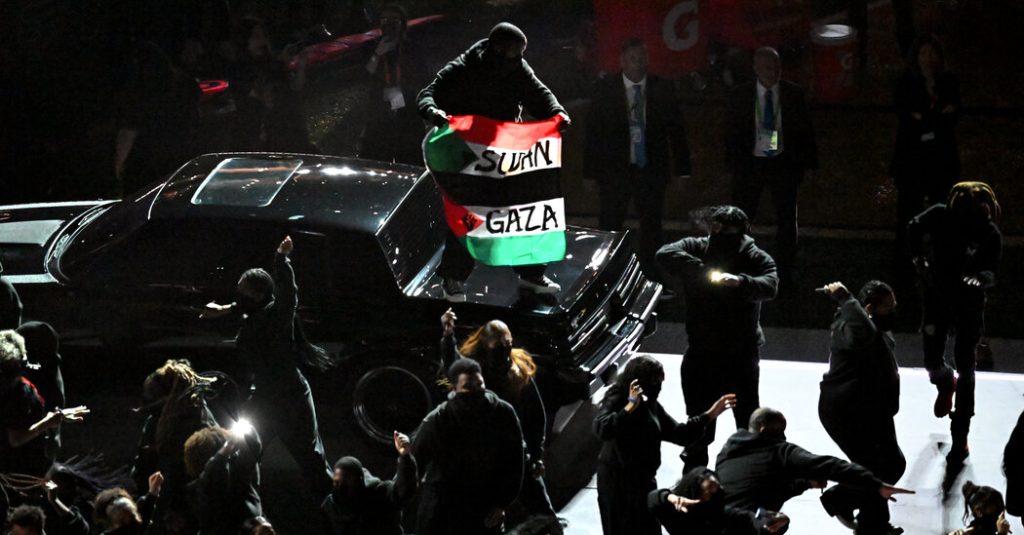The Unforgettable Moment: Kendrick Lamar’s Super Bowl Halftime Show and the Palestinian-Sudanese Flag Protest
The Super Bowl halftime show is always a moment of high anticipation and spectacle, blending music, artistry, and cultural significance. This year, Kendrick Lamar delivered a mesmerizing performance that captivated millions, but it was an unexpected moment that stole the spotlight and sparked widespread conversation. As Lamar and the entire stadium sang the catchy hook of his hit song “Not Like Us,” a lone protester emerged on the field, unfurling a combined Palestinian and Sudanese flag. The moment was brief but profound, leaving audiences and organizers alike in shock.
The Protester’s Bold Statement
The protester, later identified as part of the 400-member field cast hired for the show, managed to blend in seamlessly with the dancers and extras. Dressed in black sweats, they stood out only when they climbed onto the hood of a Buick Grand National GNX, the rare car that inspired the title of Lamar’s latest album, Mr. Morale & The Big Steppers. As Lamar transitioned into his final song, “TV Off,” the individual waved the flag, which bore the words “Sudan” and “Gaza,” alongside symbols of solidarity such as a heart and a raised fist. The act was both a statement of protest and a call for solidarity, drawing attention to the ongoing struggles in both regions.
The NFL and Roc Nation Respond
The NFL and Roc Nation, the entertainment company behind the halftime show, were quick to issue statements distancing themselves from the incident. The league explained that the protester had hidden the flag on their person and revealed it late in the performance, catching everyone off guard. “No one involved with the production was aware of the individual’s intent,” the NFL said. Roc Nation echoed this sentiment, emphasizing that the act was neither planned nor rehearsed. The protesters’ ability to sneak the flag onto the field raised questions about security protocols and the lengths to which individuals will go to make a political statement on such a massive platform.
The Aftermath: A Symbol of Resistance and Hope
Security personnel quickly intervened, tackling the protester and removing them from the field as the audience watched in a mix of confusion and awe. Despite the brief nature of the moment, it resonated deeply, sparking debates about activism, free speech, and the intersection of politics and entertainment. For many, the protester’s actions represented a bold defiance, using one of the world’s largest stages to bring attention to causes often overlooked in mainstream discourse. Others criticized the disruption, arguing that the Super Bowl halftime show was not the appropriate venue for such a demonstration.
Cultural and Political Implications
The incident underscores the growing trend of individuals using high-profile events to amplify their messages. From athletes taking a knee during the national anthem to celebrities using award show speeches as platforms for activism, such moments have become increasingly common in recent years. The protester’s choice to combine the Palestinian and Sudanese flags was particularly significant, highlighting the interconnected struggles of these regions and the solidarity that exists among their supporters. The act also raised questions about the role of art and entertainment in addressing global injustices, challenging audiences to think critically about the world beyond the spectacle.
A Lasting Legacy: The Power of Protest and Art
As the dust settles on this unexpected moment, its impact remains undeniable. Kendrick Lamar’s performance was celebrated for its artistry and energy, but it was the protester’s act that added an extra layer of depth and meaning to the event. Whether one agrees or disagrees with the method, the protest serves as a reminder of the power of individuals to challenge the status quo and bring attention to pressing issues. In a world where divisions often dominate the headlines, such acts of solidarity and resistance offer a glimmer of hope and a testament to the enduring human spirit.












